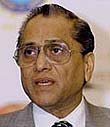Jagmohan Dalmiya: The sultan of the gentleman’s game
24 Sep 2004
Tanmoy Mitra profiles Jagmohan Dalmiya, ‘the iron man of cricket’
 He is considered a master strategist, an opportunist who plays the waiting game and a man who almost never loses his cool. In essence, Jagmohan Dalmiya has all the qualities of a politician who has been accused of bringing politics in to cricket in sharp contradiction to the adage that sports and politics do not mix. But even his worst critics will admit that Jagmohan Dalmiya’s business vision has transformed Indian cricket.
He is considered a master strategist, an opportunist who plays the waiting game and a man who almost never loses his cool. In essence, Jagmohan Dalmiya has all the qualities of a politician who has been accused of bringing politics in to cricket in sharp contradiction to the adage that sports and politics do not mix. But even his worst critics will admit that Jagmohan Dalmiya’s business vision has transformed Indian cricket.
If the Board of Control for Cricket in India (BCCI) is the richest cricketing body in the world, Dalmiya deserves his fair share of credit. Everyone, from the players to those remotely associated with the game, is making serious money. His marketing skills have taken the game to new geographies. From Bangladesh to the Netherlands and Bangkok to Toronto, Dalmiya has explored every possible angle to popularise cricket around the world.
Hailing from a wealthy Marwari business family in Kolkata, Dalmiya inherited one of India's largest construction companies at the age of 19. But it was in the business of cricket that he was destined to make his name. A traditional Marwari, Dalmiya’s two sons and their families live together with him and his wife.
As a cricketer, he opened the batting and kept wicket for one of Kolkata's leading clubs and also represented his university. Dalmiya joined the BCCI in 1979 and played a major role in bringing the cricket world cup to India and Pakistan in 1987. In 1992-93, as secretary of the board, he strategised the commercialisation of the game, which turned around the financial status of the BCCI, bringing the body some serious money — the board's balance sheet, which showed a deficit of Rs81.60 lakh in 1992-93 had declared a working profit of Rs15.34 lakh by the end of the next financial year. Today, the BCCI is a Rs100-crore turnover organisation and is looking to more than tripling its turnover to Rs365 crore three years down the line.
Dalmiya brought the 1996 World Cup to the Indian subcontinent by promising a larger share of profits to the International Cricket Council’s 23 associate members, should they vote for it to be held in the subcontinent. The world cup was a huge financial success for the Asian Cricket Council.
Globalisation of cricket entered a new phase with Dalmiya being elected chairman of the ICC in 1997. Expansion of cricket began at this stage. From Asia to Europe and to the North American continent, cricket generated millions in sponsorships and television rights and the ICC became a rich sporting body. With improved infrastructure, cricket started to be recognised seriously in the world of sports. It will soon join the Olympics as a competitive global sport.
But his unconventional style and a TV-rights controversy resulted in Dalmiya leaving the ICC in 2000. Not ready to take a backward step, Dalmiya bounced back onto the cricket scene by getting elected as BCCI’s president in 2001 for the second time. In September 2003, Dalmiya was re-elected as the board chief for his third and final term.
In July 2004, the BCCI president added one more post to his high profile career by taking over as president of the Asian Cricket Council (ACC). Dalmiya’s term as president of BCCI expires on September 29, 2004, and he is constitutionally ineligible to seek re-election. But the master strategist that he is, he had himself appointed unanimously as the patron-in-chief of BCCI on September 12, 2004, for the next three years.
According to a BCCI member this new post was created with the sole purpose of keeping Dalmiya in power. Dalmiya will represent the BCCI at ICC meetings, and play a prominent role in awarding various rights such as sponsorships and ambush marketing.
The recent Zee-ESPN row over the sale of the Rs1, 400-crore cricket telecast rights and one-day matches have put the BCCI president in the hot seat. ESPN blamed Dalmiya for not allowing them to match the amount negotiated with Zee, when telecast rights were handed to Zee. Dalmiya was accused by Zee of taking ESPN’s side when its contract was cancelled by the Bombay High Court. Dalmiya on the other hand lashed out at both channels for not coming to an agreement to ensure live telecast of the matches.
However, in a recent press release on September 22, 2004, Dalmiya has assured Indian viewers that the board was making necessary arrangements to ensure that the forthcoming India-Australia series is televised live. The BCCI plans to broadcast the series on its own if the dispute between the two channels, ESPN and ZEE, is not resolved.
Known as the iron man of Indian cricket, Dalmiya has always promised and delivered. The Australian cricket board has also expressed its confidence in his ability to resolve the row over broadcasting rights.
With Sharad Pawar contesting for the post of BCCI chairman, the tussle for control of the BCCI will be intensely political. Dalmiya and Pawar are both battle scarred heavyweights. The contest between the two will be worth watching.


















